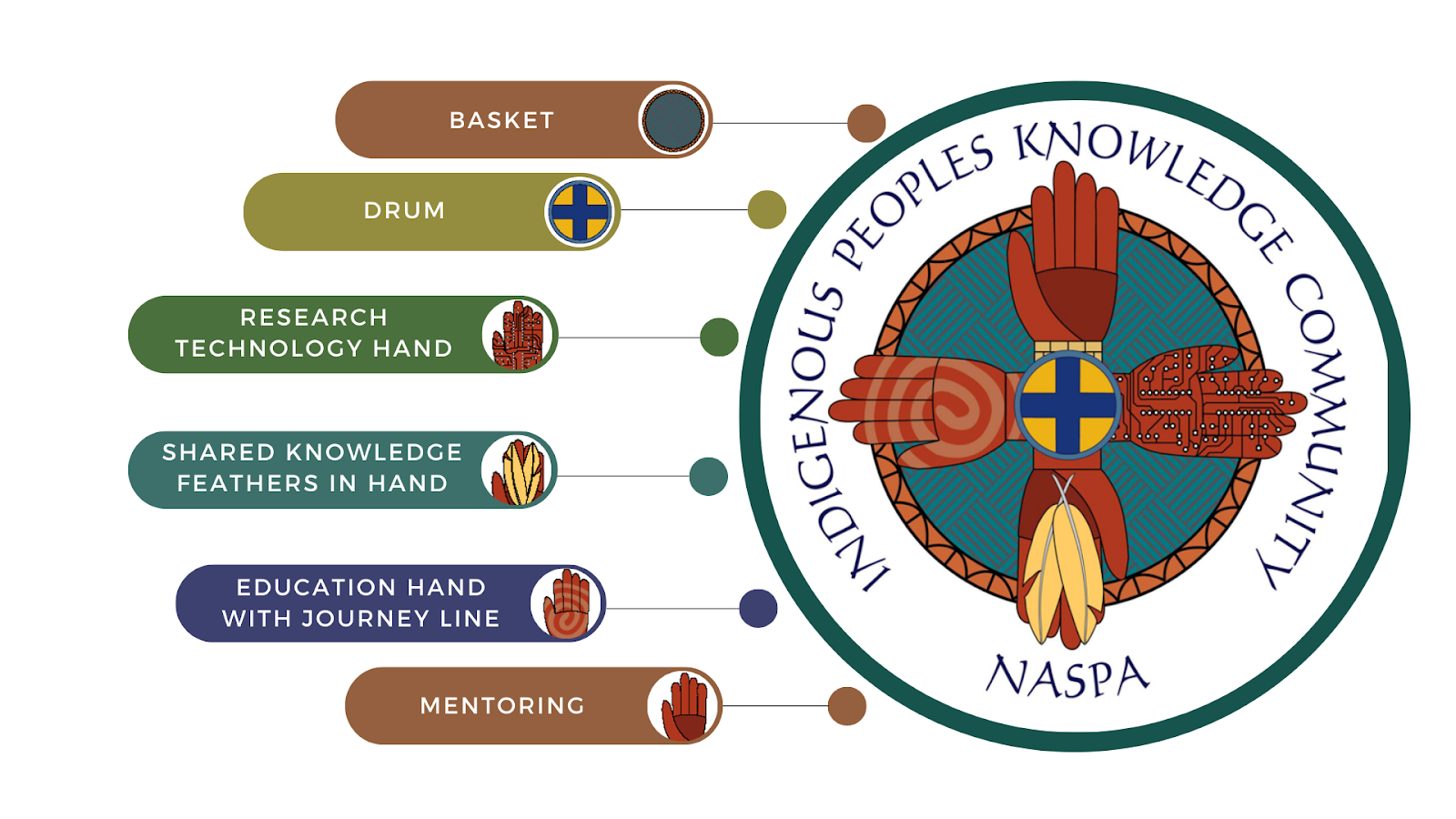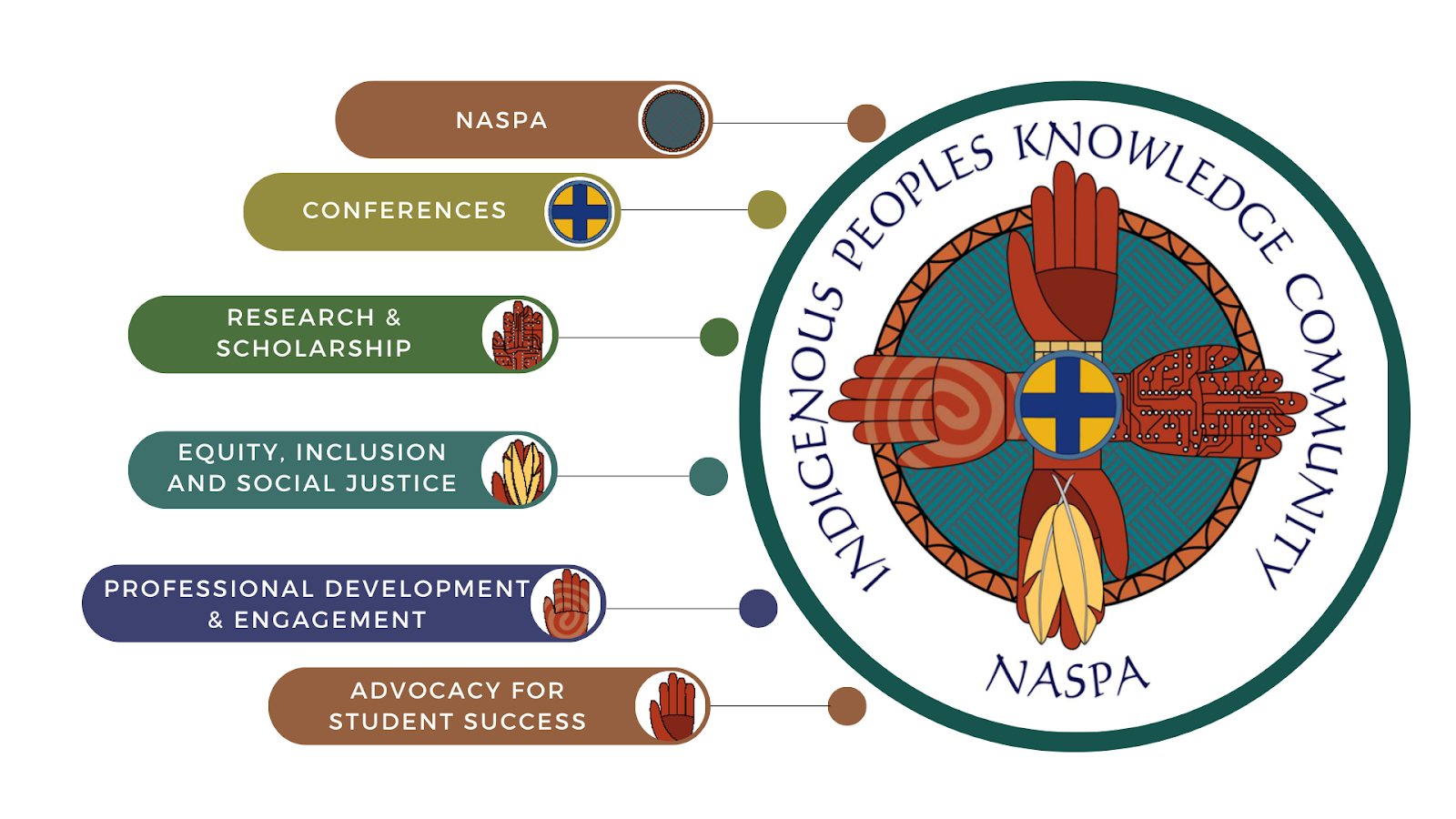Final Report to Members from the Indigenous Implementation Committee
June 18, 2024
For the past five years NASPA leadership, inclusive of our Board of Directors and staff, have undertaken intentional work to understand the experiences of and address harm to our Indigenous members. With the presentation in March 2024 of the report to the Board of Directors from the President’s Implementation Committee on Indigenous Engagement and Inclusion, I believe that we are poised and prepared to intentionally integrate Indigeneity and place consciousness across our programming and work with members.
We started this work with a gathering in February 2019 of past and current leaders of the Indigenous Peoples Knowledge Community (IPKC). In November 2020 I wrote a letter to NASPA members about Repairing and Recentering NASPA’s Work with the Indigenous Peoples Community.
The reflections I shared in that letter have continued to guide our work: that equity and inclusion aren’t universal or monolithic; an imperative to work with, rather than speak or fix on behalf of, Indigenous members; and that reconciliation requires accountability, acknowledgment, and authenticity. Through the gifts of our members’ conversations and stories, my thinking about culture, sovereignty, and belonging have been expanded and complicated.
In my 2020 message, I shared the metaphor of a “forced fit” of the round IPKC logo into the diamond-shaped NASPA logo. The distance we have covered since that time is well-represented in two images from the implementation committee’s final report. The image on the left shows the IPKC logo, which represents the Indigenous value of education and the importance of sharing knowledge through the ages. The figure on the right overlays NASPA’s strategic plan goals with the elements of the IPKC logo, demonstrating the alignment of NASPA’s goals with the IPKC’s foundations.


There is considerable alignment in the values that ground our work. In our collective efforts to develop and nurture community, create and share knowledge, and advocate for change, we should build on existing relationships and organizational strengths to sustain progress over time.
I want to acknowledge the creativity, energy, and commitment of the members of the President’s Implementation Committee:
- Pam Agoyo (Ohkay Owingeh, Cochiti, and Kewa Pueblos), Executive Director for Student Support, University of New Mexico
- Elisa Aquino (Zapotec), Program Director, Native American/Indigenous Student Success Center, San José State University
- Tiki Ayiku, (former) Assistant Vice President for Professional Development, NASPA
- Ke’Ana Bradley, Assistant Vice President, Justice, Equity, Diversity, and Inclusion, NASPA
- Brett Bruner, Assistant Vice President for Student Success and Persistence, Wichita State University
- Gretchenrae Campera, (former) Director of Regional and Justice, Equity, Diversity, and Inclusion Initiatives, NASPA
- Alexa Chamberlain, Director of Research and Strategy, NASPA
- Terry Chavis (Lumbee Tribe of North Carolina), Doctoral Student, University of North Carolina at Greensboro
- Charlotte Davidson (Diné/Mandan, Hidatsa and Arikara Nation), University of Illinois Urbana-Champaign
- Karen Francis-Begay (Diné), Independent Scholar
- Stephanie Gordon, Vice President for Professional Development, NASPA
- Asha’ Jones, Associate Director, Justice, Equity, Diversity, and Inclusion, NASPA
- Brian Medina, Program Manager, Bias Incident Support Services, University of Maryland
- Kimberlie Moock, Doctoral Candidate and Graduate Instructor, University of Minnesota, Twin Cities
- Monica Nixon, Vice President, Justice, Equity, Diversity, and Inclusion, NASPA
- Robert Rainbow (Turtle Mountain Band of Chippewa/Spirit Lake Tribe/Standing Rock Sioux Tribe), Vice President of Academics, Nueta Hidatsa Sahnish College
- Laura Roha, Director of Membership, NASPA
- Emma Spalding, Associate Director, Wellbeing Initiatives and Statewide Coalition Projects, NASPA
- Nathalie Villatoro, (former) Assistant Director for Regional and Constituent Group Program Management, NASPA
- Ross Wantland, Director of Curriculum Development and Education, Office of the Vice Chancellor for Diversity, Equity, and Inclusion, University of Illinois at Urbana Champaign
- Amber Waters, Director of Meetings and Events, NASPA
- Andrew Yazzie (Navajo), Manager of Student Success, American Indian Student Services, University of New Mexico
I offer particular gratitude to Charlotte Davidson (Diné/Mandan, Hidatsa and Arikara Nation), who has guided our work in her role as Indigenous Relations Advisor for the past three-and-a-half years, and to Pam Agoyo (Ohkay Owingeh, Cochiti, and Kewa Pueblos), who has served on the NASPA Board of Directors in two capacities. Charlotte and Pam have invested immeasurable reserves of time and heart in making NASPA a better association for all members.
The conclusion of the implementation committee’s work does not mean that we have arrived or that our work to deepen Indigenous engagement and inclusion will be less visible. Please visit NASPA’s Indigenous Engagement website for updates about this important priority for NASPA. I ask all of our members to continue to hold your association accountable to our commitments to:
- Continue to Evolve Frameworks of Indigenous Engagement, Inclusion, and Co-Creation;
- Enrich the NASPA Landscape with a More Consistent Indigenous Presence;
- Create Intentional Contexts of Learning and Development; and
- Create a Holistic System of Support for Indigenous Members